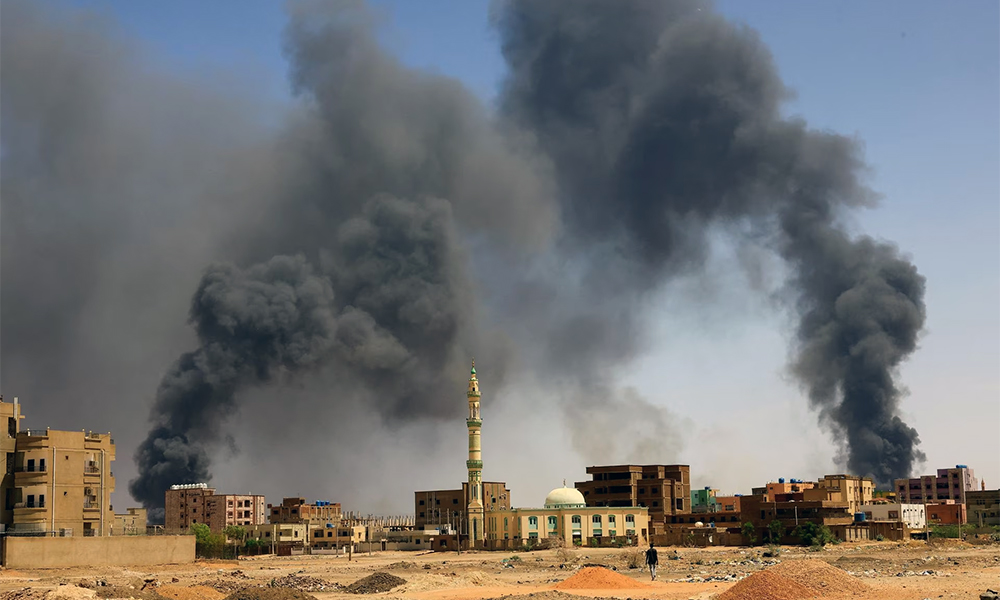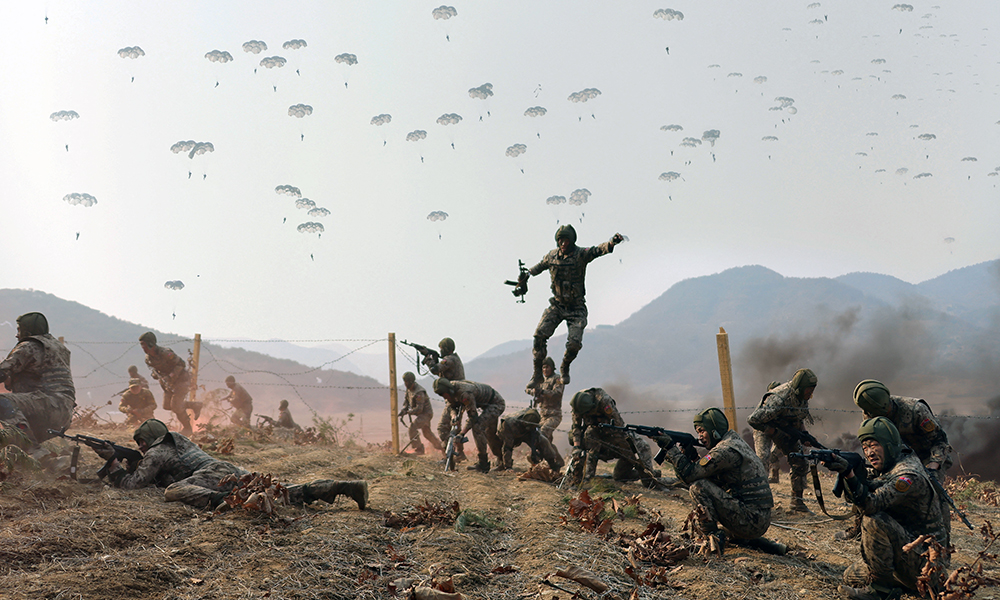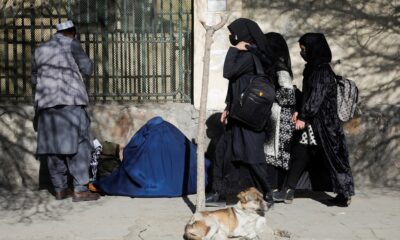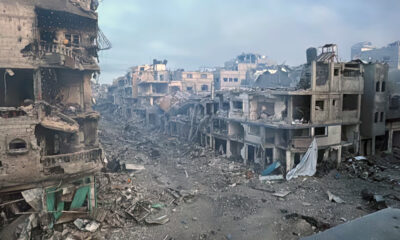World
Sudan conflict could prompt 800,000 people to flee, UN says

The United Nations warned on Monday that the conflict in Sudan could force 800,000 people to flee the country as battles between rival military factions persisted in the capital despite a supposed ceasefire, Reuters reported.
Hundreds of people have been killed and thousands wounded over 16 days of battles since disputes between the Sudanese army and the paramilitary Rapid Support Forces (RSF) erupted into conflict on April 15.
The crisis has unleashed a humanitarian disaster, damaged swathes of Khartoum, risked drawing in regional powers and reignited conflict in the Darfur region.
Many fear for their lives in the power struggle between the army chief and RSF head, who shared control of the government after a 2021 coup but fell out over a planned transition to civilian rule, Reuters reported.
Both sides agreed on Sunday to extend a much-violated truce by 72 hours, and the U.N. told Reuters the rival forces may hold ceasefire talks in Saudi Arabia. But air strikes and artillery rang out on Monday as smoke hung over Khartoum and neighbouring cities.
U.N. official Raouf Mazou said the body's refugee agency was planning for an exodus of 815,000 people including 580,000 Sudanese as well as foreign refugees now living in the country. The country's population numbers 46 million.
Some 73,000 have already left Sudan, he said.
Egypt reported 40,000 Sudanese had crossed its border, and those who made the journey said conditions were arduous. Others have gone to Chad, South Sudan and Ethiopia, or sailed across the Red Sea to Saudi Arabia on evacuation boats, read the report.
At least 528 people have been killed and 4,599 wounded, the health ministry said. The United Nations has reported a similar number of dead but believes the real toll is much higher.
Foreign governments pulled out their citizens over the past week in air, sea and land operations, though several countries ended efforts. The U.S. government said on Monday that its convoys from Khartoum to the Red Sea harbour of Port Sudan evacuated more than 700 people over the weekend.
Britain said it was exploring ways to provide humanitarian assistance to Sudan along with its international allies, the United Nations and aid organisations after evacuating nearly 2,200 people.
Meanwhile, those Sudanese who stayed behind faced hardship and danger, Reuters reported.
"I show up to work for two or three hours then I close up because it's not safe," said Abdelbagi, a barber in Khartoum who said he had to keep working because prices were rising.
People who ventured onto the streets on Monday were shocked by the transformation.
"We saw dead bodies. The industrial area that was all looted. We saw people carrying TVs on their backs and big sacks looted from factories," said resident Mohamed Ezzeldin.
Power and water supplies are uncertain, there is little food or fuel, most hospitals and clinics are out of service and soaring transport costs are making it ever harder to leave, read the report.
The U.N. and other aid organisations have cut services, though the World Food Programme said it was resuming operations in more secure areas on Monday after staff were killed early in the war.
"The scale and speed of what is unfolding in Sudan is unprecedented," said Martin Griffiths, a senior U.N. official for humanitarian and emergency relief who will visit Sudan on Tuesday.
Victoria, one of the tea sellers who used to dot Khartoum's streets before the fighting began, said her children are struggling to understand what is happening.
"So I risk my life to try to work and if God helps me, I'll get them some food, and if he doesn't I'll keep trying. But just sitting useless doesn't help and being scared doesn't help," she said.
Jamila, a woman still in Khartoum with her family, is only eating one meal a day because so little food is available. RSF troops are stationed in front of their house and refuse to leave. "The sound of fighting is in our ears all day," she said.
Both sides said on Monday they were making progress without commenting directly on the ceasefire violations, Reuters reported.
The army said it had cut RSF's combat effectiveness by half and stopped it trying to reinforce its positions in the capital. The RSF said it still controls main locations of Khartoum and was itself beating back army reinforcements.
World
North Korean troops suffer 100 deaths, struggling in drone warfare, South Korea says
More than 10,000 North Korean troops have been deployed to help Russia in the war, according to U.S. and South Korean officials.

At least 100 North Korean troops deployed to Russia have been killed with another 1,000 injured in combat against Ukrainian forces in intense fighting in the Kursk region, Reuters cited a South Korean lawmaker said on Thursday citing the country's spy agency.
The heavy losses are attributed to the lack of experience by North Korean troops in drone warfare and unfamiliarity with the open terrain where they are taking part in the battle, a member of parliament Lee Seong-kweun told reporters.
Lee was speaking after a closed-door briefing by the National Intelligence Service (NIS) to parliament.
The discrepancy in the estimate of the troops killed from that made by a U.S. military official who cited several hundred casualties is because of the relatively conservative analysis by the NIS, Lee said.
"There was a report that there have been at least 100 deaths and the injured are approaching 1,000," he said.
There are indications that the North is preparing for additional deployment, Lee said, including intelligence of the country's leader Kim Jong Un overseeing training, read the report.
The report echoed comments by U.S. and Ukrainian officials that North Korean losses are heavy and that Russia was using them in large numbers in assaults in Kursk, a Russian region where Ukraine launched a cross-border incursion in August.
More than 10,000 North Korean troops have been deployed to help Russia in the war, according to U.S. and South Korean officials. Pyongyang has also shipped more than 10,000 containers of artillery rounds, anti-tank rockets as well as mechanised howitzers and rocket launchers.
Neither the North nor Russia have officially acknowledged the troop deployment or the weapons supply.
Russian President Vladimir Putin visited Pyongyang in June and signed a "comprehensive strategic partnership" treaty with North Korean leader Kim Jong Un that included a mutual defence pact.
Earlier on Thursday, North Korea said its military alliance with Russia is proving "very effective" in deterring the United States and its "vassal forces," denouncing a recent statement by Washington and allies against ties between Pyongyang and Moscow, Reuters reported.
North Korea made no mention of its involvement in the war in Ukraine or casualties.
Instead it denounced a statement by the United States and nine countries and the European Union issued on Monday as "distorting and slandering the essence of the normal cooperative relations" between the North and Russia.
In a statement by an unnamed foreign ministry spokesman, the North blamed Washington and its allies for prolonging the Ukrainian war and destabilising the security situation in Europe and Asia-Pacific.
"It is because of the misguided acts of the U.S. and the West persisting in their structure-destructive, hegemony-oriented and adventuristic military policy," it said.
World
NATO takes over coordination of military aid to Kyiv from US, source says
Trump, who will take office in January, has said he wants to end the war in Ukraine swiftly but not how he aims to do so. He has long criticised the scale of U.S. financial and military aid to Ukraine, read the report.

NATO has taken over coordination of Western military aid to Ukraine from the U.S. as planned, a source said on Tuesday, in a move widely seen as aiming to safeguard the support mechanism against NATO sceptic U.S. President-elect Donald Trump, Reuters reported.
The step, coming after a delay of several months, gives NATO a more direct role in the war against Russia's invasion while stopping well short of committing its own forces.
Diplomats, however, acknowledge that the handover to NATO may have a limited effect given that the U.S. under Trump could still deal a major setback to Ukraine by slashing its support, as it is the alliance's dominant power and provides the majority of arms to Kyiv.
Trump, who will take office in January, has said he wants to end the war in Ukraine swiftly but not how he aims to do so. He has long criticised the scale of U.S. financial and military aid to Ukraine, read the report.
The headquarters of NATO's new Ukraine mission, dubbed NATO Security Assistance and Training for Ukraine (NSATU), is located at Clay Barracks, a U.S. base in the German town of Wiesbaden.
A person familiar with the matter told Reuters it was now fully operational. No public reason has been given for the delays.
NATO's military headquarters SHAPE said its Ukraine mission was beginning to assume responsibilities from the U.S. and international organizations.
"The work of NSATU ... is designed to place Ukraine in a position of strength, which puts NATO in a position of strength to keep safe and prosperous its one billion people in both Europe and North America," said U.S. Army General Christopher G. Cavoli, the Supreme Allied Commander Europe.
"This is a good day for Ukraine and a good day for NATO."
In the past, the U.S.-led Ramstein group, an ad hoc coalition of some 50 nations named after a U.S. air base in Germany where it first met, has coordinated Western military supplies to Kyiv.
Trump threatened to quit NATO during his first term as president and demanded allies must spend 3% of national GDP on their militaries, compared with NATO's target of 2%.
Meanwhile, the outgoing Biden administration in Washington is scrambling to ship as many weapons as possible to Kyiv amid fears that Trump may cut deliveries of military hardware to Ukraine.
NSATU is set to have a total strength of about 700 personnel, including troops stationed at NATO's military headquarters SHAPE in Belgium and at logistics hubs in Poland and Romania, read the report.
Russia has condemned increases in Western military aid to Ukraine as risking a wider war.
World
At least 100,000 bodies in Syrian mass grave, US advocacy group head says

The head of a U.S.-based Syrian advocacy organization on Monday said that a mass grave outside of Damascus contained the bodies of at least 100,000 people killed by the former government of ousted President Bashar al-Assad.
Mouaz Moustafa, speaking to Reuters in a telephone interview from Damascus, said the site at al Qutayfah, 25 miles (40 km) north of the Syrian capital, was one of five mass graves that he had identified over the years.
"One hundred thousand is the most conservative estimate" of the number of bodies buried at the site, said Moustafa, head of the Syrian Emergency Task Force. "It's a very, very extremely almost unfairly conservative estimate."
Moustafa said that he is sure there are more mass graves than the five sites, and that along with Syrians victims included U.S. and British citizens and other foreigners.
Reuters was unable to confirm Moustafa's allegations.
Hundreds of thousands of Syrians are estimated to have been killed since 2011, when Assad's crackdown on protests against his rule grew into a full-scale civil war.
Assad and his father Hafez, who preceded him as president and died in 2000, are accused by Syrians, rights groups and other governments of widespread extrajudicial killings, including mass executions within the country's notorious prison system.
Assad repeatedly denied that his government committed human rights violations and painted his detractors as extremists.
Syria's U.N. Ambassador Koussay Aldahhak did not immediately respond to a request for comment. He assumed the role in January - while Assad was still in power - but told reporters last week that he was awaiting instructions from the new authorities and would "keep defending and working for the Syrian people."
Moustafa arrived in Syria after Assad flew to Russia and his government collapsed in the face of a lightning offensive by rebels that ended his family's more than 50 years of iron-fisted rule.
He spoke to Reuters after he was interviewed at the site in al Qutayfah by Britain's Channel 4 News for a report on the alleged mass grave there.
He said the intelligence branch of the Syrian air force was "in charge of bodies going from military hospitals, where bodies were collected after they'd been tortured to death, to different intelligence branches, and then they would be sent to a mass grave location."
Corpses also were transported to sites by the Damascus municipal funeral office whose personnel helped unload them from refrigerated tractor-trailers, he said.
"We were able to talk to the people who worked on these mass graves that had on their own escaped Syria or that we helped to escape," said Moustafa.
His group has spoken to bulldozer drivers compelled to dig graves and "many times on orders, squished the bodies down to fit them in and then cover them with dirt," he said.
Moustafa expressed concern that graves sites were unsecured and said they needed to be preserved to safeguard evidence for investigations.
-

 Latest News5 days ago
Latest News5 days agoAfghanistan seals T20I series victory over Zimbabwe
-

 Latest News5 days ago
Latest News5 days agoU.S. sentences Afghan man to 30 years in prison for narco-terrorism and witness tampering
-

 International Sports4 days ago
International Sports4 days agoMessi vs Ronaldo: A look at their market values over the years
-

 Latest News5 days ago
Latest News5 days agoInvestment in Afghanistan’s pharmaceutical sector reaches $300 million: Union
-

 Sport5 days ago
Sport5 days agoAfghanistan’s Gulbaddin Naib fined 15% of match fee for dissent
-

 Regional4 days ago
Regional4 days agoHezbollah chief says group lost its supply route through Syria
-

 Latest News4 days ago
Latest News4 days agoInjustices against Afghan women threaten global equality: US
-

 Sport3 days ago
Sport3 days agoATN to broadcast exciting 2025 ICC Champions Trophy live in Afghanistan
























